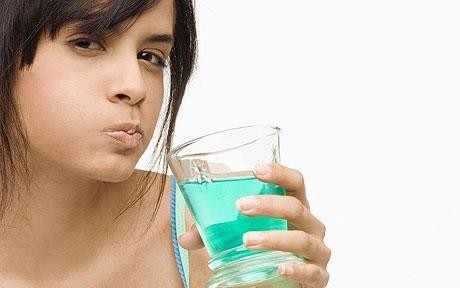Much like the tic-tac-toe, good dental habits come in three.

Proper brushing and flossing are crucial towards keeping your children’s teeth healthy and strong. But mouthwash also plays an important role. Mouthwash is effective in fighting against tooth decay, plaque, as well as gingivitis [1]. It’s especially useful for treating hard-to-reach areas of the mouth that a toothbrush or floss simply can’t.
Parents realize that even though your child’s baby teeth will be lost in a few years, they are still important and need to be taken care of. Healthy oral habits need to be established at an early age, to ensure their adult teeth are protected later on. However, you should wait until your child is older before using mouthwash. According to the American Dental Association (ADA), only children older than age 6 should use mouthwash since they are less likely of swallowing it [2].
One way to see if your child is ready for mouthwash is by using the ‘spit test’. Fill a cup with some water, have your child rinse their mouth with it, and spit it back into the cup. If they’re able to spit all the water back into the cup, it means they’re ready for mouthwash [3]. Since learning to gargle can be difficult for young children, they should always be supervised by an adult.
Benefits of Children’s mouthwash
There are numerous lifelong benefits of using mouthwash from an early age. Your teeth will be healthier and stronger and will be less prone to cavities in the long run. And though these lasting benefits are great, it’s the immediate ones that kids will notice the most.
There is an assortment of rinses available. Many of them are aimed at kids, including alcohol-free ones. Adult mouthwashes contain alcohol for a deeper clean, so children’s mouthwashes are safer in case of accidental ingestion. Some rinses will even coat the teeth in a different color where there are food debris and bacteria left behind after brushing. This shows the exact spots that children have missed, and gives them the chance to fix the problem, by getting rid of the color and food debris that’s still there. This teaches children not to hurry and to pay attention to how well they are brushing.
Many children’s mouthwash is also taste-friendly, with flavors such as berry and juicy mint. A yummy tasting mouthwash encourages them to use it on a daily basis. A good idea is to let your child choose the flavor to make it more likely of them liking it.
Just remember before teaching your kid to use mouthwash, make it clear that it doesn’t excuse them from regular brushing and flossing. By teaching your child good dental habits early on, they will understand the importance of taking care of their teeth for many years to come.
Sources
[1] Reviewsmdd. [2013, November 14]. “4 Benefits of Using Mouthwash” Retrieved from http://www.martindaledental.com/4-benefits-of-using-mouthwash/
[2] Morrow Lai & Edwards Pediatric Dentistry. [2012, October 22]. “When should Your Child Start Using Mouthwash?” Retrieved from http://www.tulsadentistryforchildren.com/blog/2012/10/when-should-your-child-start-using-mouthwash/
[3] Dentistry for Children. (n.d.). “When should My Child Start using Mouthwash?” Retrieved from http://www.dentistry4children.com/when-should-my-child-start-using-mouthwash/

